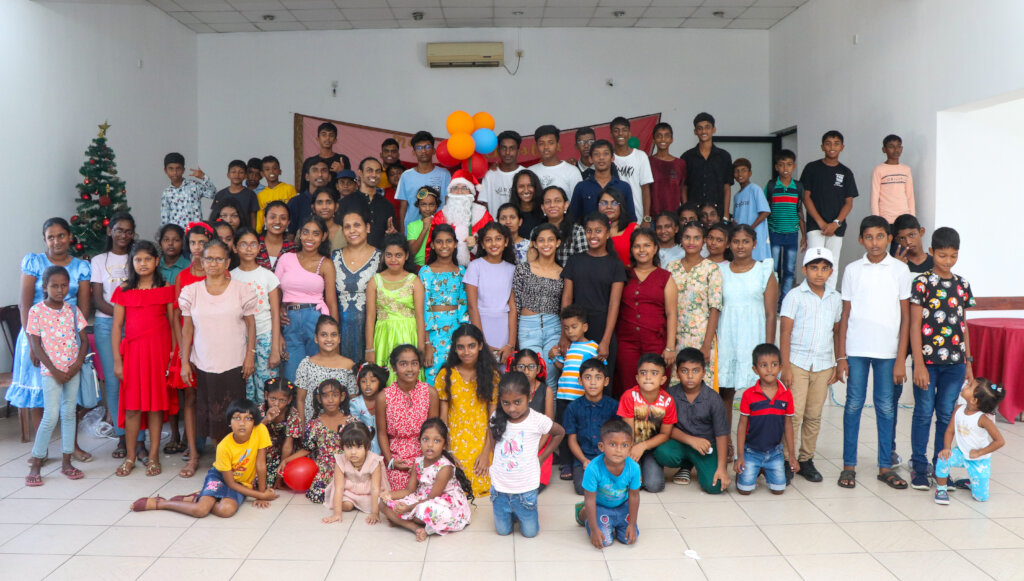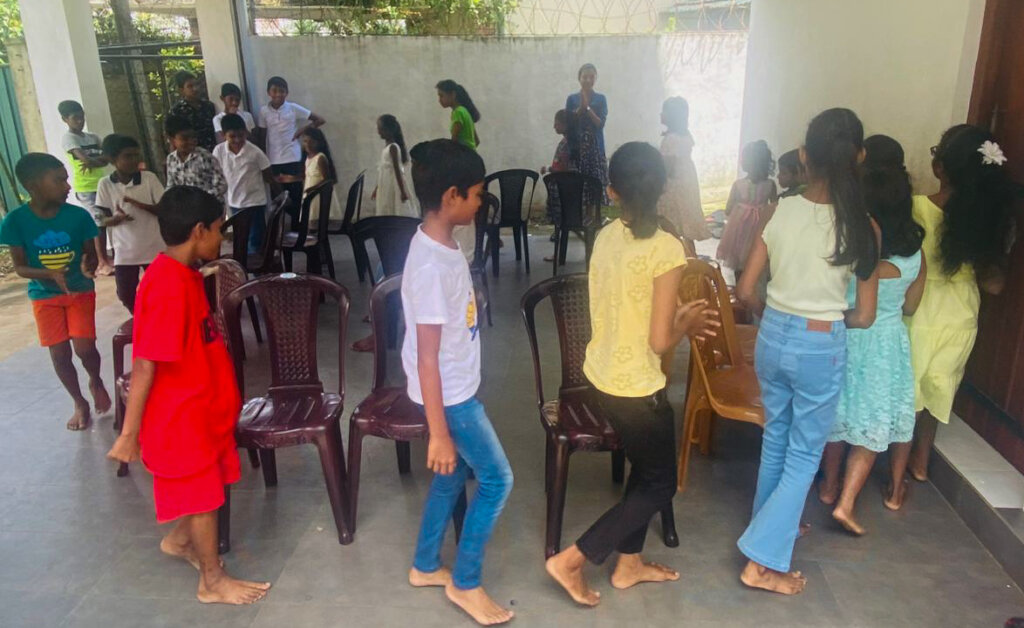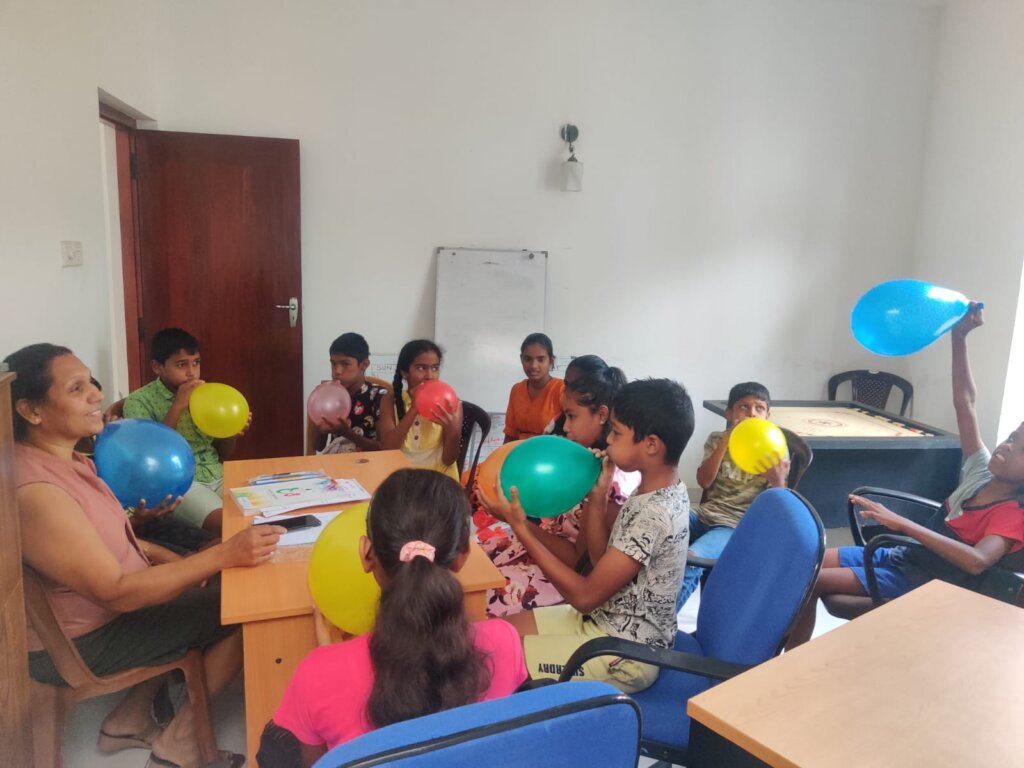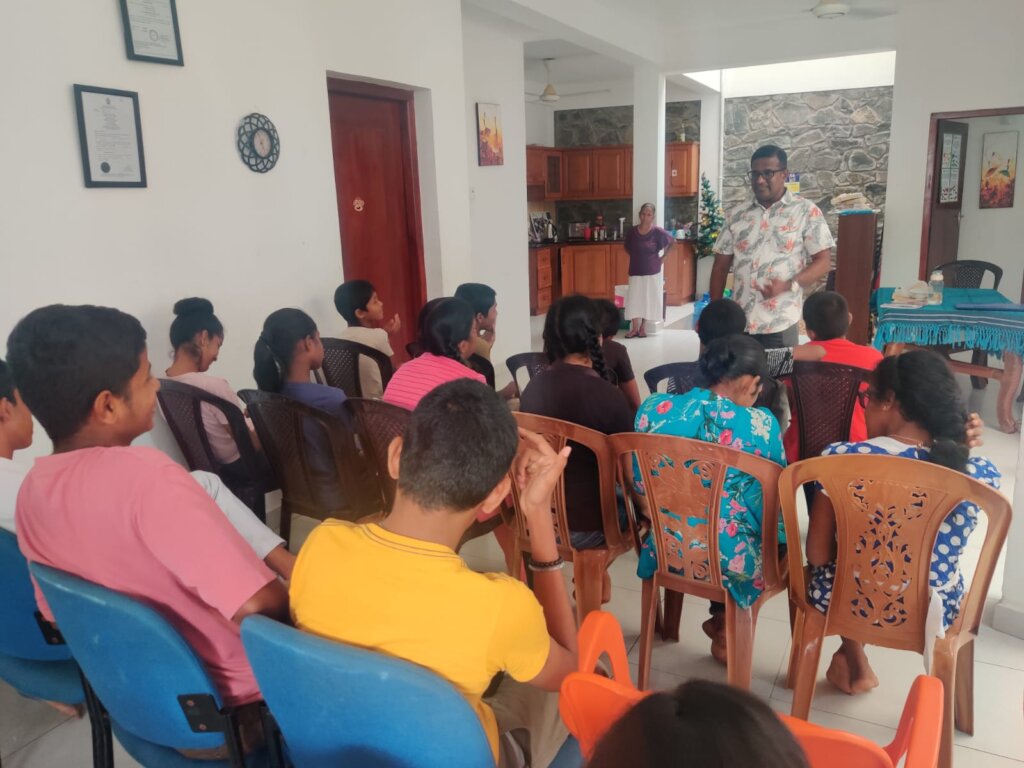By Yalini Saranya | Center Manager-Shanthi Maargam
This report provides a summary of the activities and progress made in the third quarter of the project, “TransformingYouthforaPeaceful and Inclusive Society: through Psychosocial Support and Holistic Learning,” covering the period from October to December 2024. During this time, the focus was on making significant progress towards two key goals that are central to the project’s mission: promoting positive development and reducing violence among adolescents and youth.
Themaintwokeyobjectivesoftheprojectare:
Using a Positive Youth Development (PYD) framework, the project aims to improve the emotional well-being of children and youth in urban poor communities. it is expected to help reduce mental health issues like anxiety, depression, and stress, while also enhancing their life skills.
Overview of Children of Shanthi Maargam
This overview of the children at Shanthi Maargam is based on data from 53 participants, reflecting available information. the data for the overview of the Shanthi Maargam children were collected through observation and experience. The data highlights key issues affecting children, with economic hardships being the most prevalent, followed by parental substance use, absence of parental figures, and family imprisonment. Other concerns include school dropouts and involvement in drug-related activities, underscoring the need for targeted support.
Activity 1: Sustain and increase the outreach of high-quality counseling services for adolescentsandyouthinpoorurbancommunitiesandnationalleveltoincreasetheiremotional well-being.
Counseling Services for Mental Health Support
During October, November, and December 2024, a total of 173 counseling sessions were conducted, supporting 26 clients. Out of these, 20 clients had already been receiving counseling prior to the start of the quarter, while 6 were new clients. The progress of the clients was evaluated through various factors, such as their ability to express emotions, cope with stress, set and achieve goals, and their overall sense of well-being. Notable signs of progress included clients finding the courage to discuss past traumas, improving communication with their families, realizing the need for change in their patterns, and setting personal goals related to education or career.
The counseling team also participated in regular supervision sessions to ensure the quality of their work and address challenges. The hotline counselors had weekly supervision, while in-person and online counselors had bi-weekly sessions. In total, there were 8 supervision sessions during this period. These sessions provided a confidential space for counselors to reflect on their work, discuss challenges, and seek support. The focus was on exploring personal biases, burnout, and emotional strain. Counselors were also able to ask for advice on handling difficult cases, learn new techniques, and discuss ethical dilemmas. For example, if a hotline counselor faced harassment from a caller, they discussed the need to block the caller and ensure their own safety and well-being.
FacilitateSupportGroupServices
The support group sessions were designed to help children understand and deal with peer pressure, a common challenge they face in various situations. During the session, the group discussed several aspects of peer pressure, including defining it, recognizing when it happens, and identifying both its positive and negative effects. The children also worked on strategies for staying true to themselves and making their own decisions, even when others might be pressuring them.
Although the session was brief, it was successful in meeting its main goals. The children were actively engaged, and the activities helped them feel more comfortable and open with each other. For example, a game like "Two Truths and a Lie" allowed them to share personal stories and build connections within the group, which helped create a sense of trust and rapport.
The session also focused on understanding what the children hoped to get out of the group experience. This allowed the facilitators to gauge their skills in different areas, including motor skills, problem-solving, and their ability to read and write. Overall, the session helped build a sense of community, encouraged self-expression, and provided a supportive space for the children to connect with each other and the volunteers.
Community Engagement Initiatives for the Counseling Program
The school workshops, with 35-40 students attending each session, focus on helping students understand emotions better. The main goals are to help them identify and describe different emotions, explore how emotions can be complex in various situations, and see how emotions, situations, and responses are connected.
The school workshops aim to help students understand how emotions show up and affect behavior. They also encourage group collaboration through creative activities like storytelling, where students present emotions through visual, tactile, and social elements. These interactive sessions allow students to work together and explore how emotions influence actions and interactions.
Mental Health Education workshops for parents or teachers in community Schools or communities
Mental health workshop was held for parents to help them understand the importance of empathy in parenting. The session focused on teaching parents how empathy can strengthen their emotional connections with their children, improve communication, and create better bonds.
During the workshop, parents learned how empathy plays a key role in understanding and responding to their children’s feelings. It gave them practical tools to improve their reactions and communication, leading to healthier family relationships and better mental well-being in the community. One of the activities involved role-playing a scenario where a mother comes home exhausted to find her child ignoring her while on their phone. The group discussed the emotions of both the mother and the child and suggested ways the situation could be handled more calmly. This activity emphasized the importance of pausing to understand emotions before reacting, which helped parents learn more thoughtful ways to respond to everyday challenges.
Mental Health Education community workshops for children
The workshops focused on three main themes: Working as a Group, Non-Violent Communication, and Improving Listening Skills. The aim was to engage the students in activities that would help them understand group dynamics and improve their communication skills. The sessions were a mix of theoretical learning and interactive activities. During the group work sessions, the children reflected on teamwork, discussing both its benefits and challenges. In the Non-Violent Communication session, the children explored different ways to resolve conflicts, with some admitting to using physical actions in tense situations. The session then taught them peaceful, effective communication techniques to handle conflicts without violence.
The Improving Listening Skills session was fully activity-based, which kept the children engaged and promoted better communication. It encouraged them to listen carefully, ask questions, and communicate more clearly. This approach helped them develop stronger communication skills and increased their involvement in the activities. workshops provided valuable lessons on teamwork, conflict resolution, and listening, and the children responded positively to the interactive, hands-on learning approach.
Activity 2: Internship Program
The internship consisted of observational visits (National Institute of Mental Health, ADIC Sri Lanka and The Employers' Federation of Ceylon), protocol training workshops (Youth Center, Child Protection Policy, HR Policy, Suicide Prevention, Self Harm Prevention, Domestic Violence Prevention, Gender-Based Violence Prevention, Anxiety & Panic Attack Prevention, HIV/ AIDs awareness, Hotline Management, and Social Media Protocol) and sessions carried out as part of the internship programme with both in-house and external facilitators (Basic Counselling Skills, Introduction to LGBTIQA+, LGBTIQA+ & Counselling, Community Counselling, Psychological First Aid, Introduction to Dialectical Behavioral Therapy, Persons with Disabilities, Art Therapy, Drama Therapy, Dance Therapy, Music Therapy, Mindfulness & Meditation, Working in Mental Health Research, Project Management, Goal Setting in Counselling, Self Care 101, Psychodrama and Expressive Arts Therapy, Professional Skills and Ambiguous Loss).
Through each session the interns received a clearer idea on the topic discussed, leaving a lasting impact on each intern. It was not just for a potential mental health career, but also for their personal lives as all the sessions were interactive and experiential. As each of the interns have mentioned, in their own words, that what they gained during the internship was not just professional but personal. One key point emphasized was how counseling skills, like empathy and validation, can be applied to all types of relationships, even outside of therapy. Many people shared how these skills have positively influenced their connections, helping them create safer and more supportive spaces for others.
Activity 3: PATHS to Change Program
This session included activities such as storytelling, Inflating Balloons Activity, Sharing Feelings, Diary of Feelings which were designed to make the children better understand and manage their emotions. The PATH program was able to create emotional awareness, self-expression, and empathy among the children. It was quite a successful program in this way because it was a place where children could talk to each other about their feelings and through such dialogue consider the best reactions and the best words to use to express them.
In reality, storytelling played a crucial role in developing stronger bonds between the children as they could relate to each other by listening to peers' experiences. However, some children hesitated to share due to fear of judgment, highlighting the importance of creating a trusting and non-judgmental environment. One session ran mainly on cognitive skills, particularly on the topic of math, where children reiterated their experiences and the consequent breakthrough of the link between logical thinking and math pertaining skills. It made problem-solving skills more accessible and more fun for them than before.
In the future, upcoming sessions will continue to develop these beneficial changes through utilization of emotional skills-oriented activities as well as trust-building exercises that will involve all new and veteran group members. Moreover, Personalized assistance and follow-up strategies are instrumental in this emotional development in children
Activity 4: Conducting programs to improve skills in children and youth using a PYD Approach
These Activities focused on:
Activities of PYD Approach
Key elements
Children’s Day
PYD Workshop on Entrepreneurship
Development of Soft Skills and Creativity
Workshop on Line Drawing Skills Development
Christmas Event
Identifying, Setting, and Reaching Goals
Activity 5: Working with parents / caregivers and teachers to be more responsive towards children and youth within their homes and communities
A quarterly parents' meeting took place with 19 parents attending. They expressed their desire for the organization to help their children develop positive traits that would support their overall well-being and future success. The conversation then turned to the importance of children’s well-being, with a focus on how important it is for parents to take care of themselves too.
Parents were encouraged to set aside time each day for self-reflection and self-care. They also shared how much they valued the mental well-being lessons their children had learned, which they felt were unique to the program. The parents also praised the strong, positive relationships between the staff and the children.
Activity 6: Period Prosperity: Driving Change for Inclusive Menstrual Health and Empowerment
Medical Awareness Session, providing an informative discussion on menstrual health and female personal hygiene. Facilitator explained the female reproductive system, both external and internal, and shared tips for maintaining hygiene in a healthy way. Main outcomes of this activity are Enhanced Health Literacy, Myth-Busting and urban poor Community Awareness. This training improves participants' understanding of menstrual health and hygiene, to raise awareness within the community about menstrual health issues, challenge social myths and stigmas related to menstruation and positively impact women’s health through education and awareness.
Most Significant Change
Significant behavioral improvements have been observed among children previously engaged in aggressive behaviors, such as drug use and verbal or physical altercations. These children have demonstrated increased responsibility, and the frequency of drug use has reduced. A notable example is their involvement in coordinating the Christmas event, where they contributed to decorations, rehearsals, and performances.
One of the most significant changes resulting from Shanthi Maargam's work with schools is the reduction in the stigma surrounding mental health and seeking professional support, such as counseling. This was particularly evident when we saw children coming to the center in their school uniforms after hours for their scheduled sessions, often bringing a friend along. This shift in behavior highlights a major change in their attitudes, as they now seek mental health support without hesitation or embarrassment.
A significant change within the school community is the growing discussion among teachers about mental well-being, which is beginning to influence both their interactions with students and their personal conduct. This shift is evident in the increasing number of teachers reaching out to the community-based counselor for guidance. It highlights a gradual yet meaningful transformation in attitudes toward mental health, signaling positive progress within the school environment. One of the most significant achievements of our school program has been the provision of a safe space, not only for school children but also for teachers and principals. This has enabled open discussions on topics related to mental health, marking considerable progress for the school community. Such efforts emphasize the importance of mental well-being within the urban poor community.
As a result of the PYD workshops, such as the career guidance workshop, children who had completed their O/Ls but were previously inactive found new motivation to develop their careers. For example, the National Apprentice and Industrial Training Authority (NAITA) workshop inspired some children to seek opportunities to enhance their skills and knowledge by enrolling in courses like motor mechanics, salon management, and hotel services.
During one of the support group sessions, a child who had been attending counseling approached us for help with an online harassment issue affecting someone they cared about. This shows how much trust they have built in Shanthi Maargam, feeling comfortable enough to reach out for support when needed. A 13-year-old young male and a 16-year-old young female, who are siblings, attended the guitar class as complete beginners. They discovered their skill and interest in playing and performing, which motivated them to save money and purchase their own guitar. Their skills have since improved significantly, and they now perform at all Shanthi Maargam events.
Success stories
At the beginning of the counseling sessions, the client reported being highly anxious, unproductive, low in motivation to do assignments, and had severe procrastination tendencies. Through the process the client was able to understand some of her thinking patterns and beliefs, find better ways to cope with her stressors and create plans to aid her when she felt overwhelmed. The client is now engaging well in her university education. Her grades have increased and is able to enjoy herself whilst also engaging in the required work.
At the beginning of the school session, facilitators introduced a story involving four friends representing key emotions: joy, sadness, anger, and fear. The activity invited students to participate by acting out the emotions. Many students enthusiastically volunteered, creatively expressing these emotions through gestures and actions. This active engagement not only reinforced the learning objectives but also fostered confidence and a sense of involvement among the participants. Another success story from our school workshop involves a student from a school we work with has taken on leadership roles, such as becoming the Deputy Head Prefect, and has started exploring new interests, like photography.
During one of the support group sessions, a child who initially experienced isolation from her peers in a school was identified during a workshop and was encouraged to enroll at Shanthi Maargam as she lives nearby. Following her registration, she was invited to join a support group. This opportunity fostered a significant positive change, as she successfully built connections and formed friendships with two peers highlighting a sense of belonging.
By Razmina Razeen | General Manager
By Razmina Razeen | General Manager
Project reports on GlobalGiving are posted directly to globalgiving.org by Project Leaders as they are completed, generally every 3-4 months. To protect the integrity of these documents, GlobalGiving does not alter them; therefore you may find some language or formatting issues.
If you donate to this project or have donated to this project, you can receive an email when this project posts a report. You can also subscribe for reports without donating.
Support this important cause by creating a personalized fundraising page.
Start a Fundraiser


